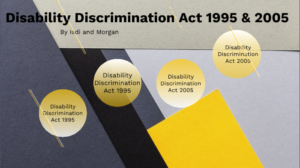What Does the Disability Discrimination Act Do?
admin
- 0
Disability Discrimination Act Do
The American with Disabilities Act prohibits employers and service providers from treating people with disabilities less favourably. Discrimination must be justified under the Act, including safety concerns or lack of capacity. If these reasons are used, a claim can be made. In some cases, employers and service providers are not required to disclose their disability-related practices to employees or customers. But if you are still unsure, here are some examples of workplace practices that are protected by the act.
Under the ADA, certain mental health conditions are also covered. This includes schizophrenia, bipolar affective disorder, panic disorders, and depressive conditions. Under the act, employers with more than fifteen employees must provide reasonable adjustments to applicants with disabilities. Although the list is not exhaustive, employers should consider seeking independent legal advice when deciding what reasonable adjustments to make. In any case, employees should not be forced to adjust their daily lives simply because of their disability.
While the ADA does not cover every possible situation, it does cover many types of workplace discrimination. The ADA is aimed at protecting individuals with disabilities who have a physical or mental impairment. It also protects people with disabilities who are accompanied by a trained animal, have an assistant, or are otherwise unable to do certain activities due to their disability. The ADA also prohibits employers from discriminating against employees with disabilities based on the type of job or position they hold.

What Does the Disability Discrimination Act Do?
Employers must provide reasonable accommodations to disabled employees and job applicants. Reasonable accommodations may include changes in the workplace to accommodate certain disabilities. Employers are not required to guess what an employee will need, but they must engage in an interactive process with the employee to ensure a fair and equitable outcome. A fair process should be conducted between employee and employer, allowing for open communication. This way, both parties can agree on the best course of action.
The disability discrimination Act was passed by parliament in 1995 to protect people with disabilities. Its sections on education, employment, and provision of goods and services have been expanded by case law and government guidance since then. The act has led to a dramatic change in attitudes towards disabled people and their employment. It is important to note that it applies to mental health professionals, too. And the disability discrimination act does not just cover mental health conditions.
The American with Disabilities Act has five titles, or sections, that relate to different areas of public life. In the case of employment, it prevents discrimination based on disability and places employees and employers on equal footing with others. The ADA also prohibits discrimination in Federal contracts. Federal contractors must ensure that they take affirmative action to hire and advance people with disabilities. They should contact the Equal Employment Opportunity Office if they have any questions about these requirements.

